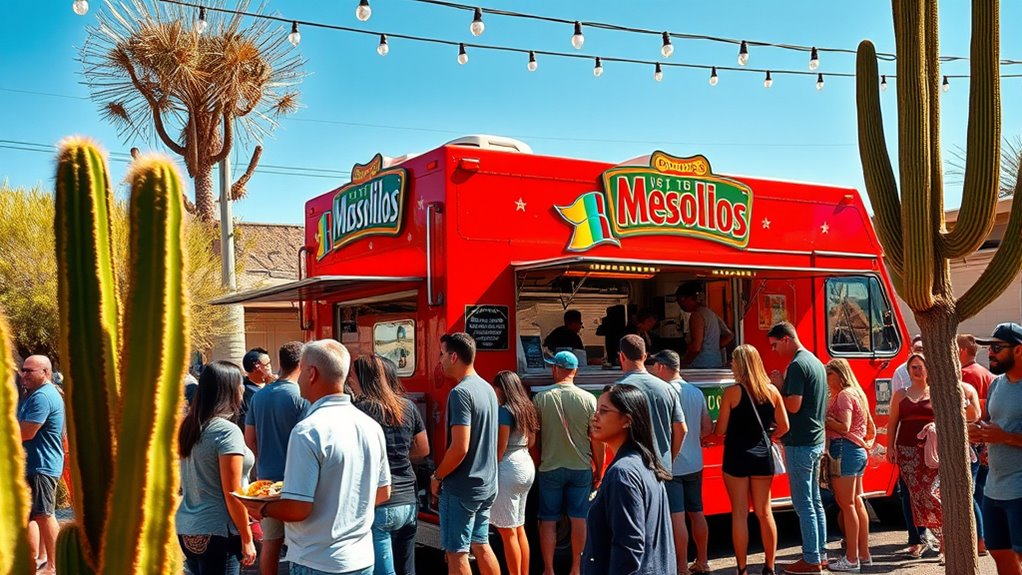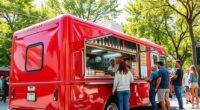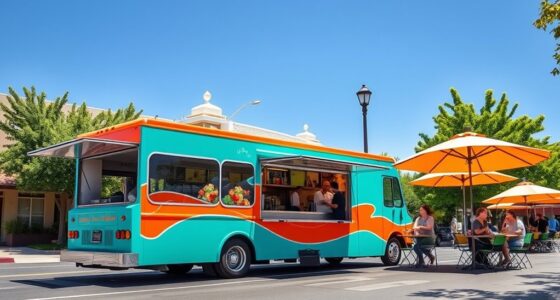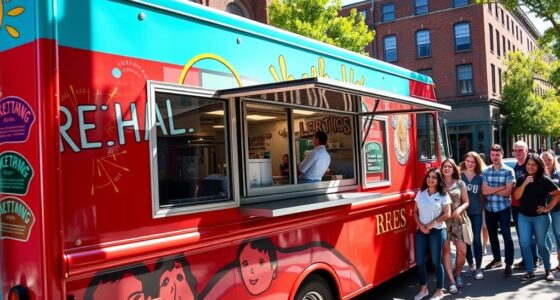To start a food truck in Mesa, AZ, you need to understand local regulations like permits, sanitation protocols, and zoning rules through the city’s official website. Plan your kitchen layout, budget for vehicle outfitting, and explore SBA loans for financing. Focus on local flavors, marketing via social media, and participating in community events to attract customers. Mastering these steps helps build a successful mobile food business—keep going to discover all the key details.
Key Takeaways
- Obtain necessary permits and licenses through Mesa’s online application process, ensuring compliance with local health and operational regulations.
- Choose a suitable, compliant food truck vehicle and plan efficient kitchen layout to maximize space and workflow.
- Secure funding via SBA loans and purchase insurance to protect against liabilities and cover startup costs.
- Develop a menu featuring local ingredients and trending dishes, balancing authenticity and affordability for Mesa’s market.
- Implement marketing strategies using social media, community events, and customer loyalty programs to grow your local presence.
Food Truck Industry Overview
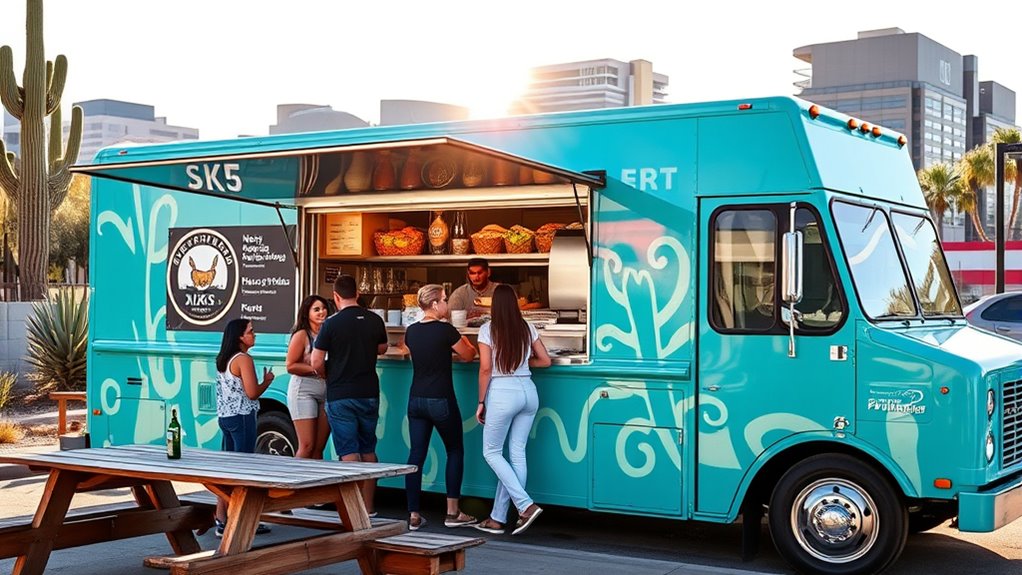
The food truck industry has experienced rapid growth in recent years, transforming from a niche market into a popular and competitive sector of the foodservice industry. As you enter this field, you’ll find that maintaining your truck through regular food truck maintenance is essential to keep operations running smoothly and avoid costly breakdowns. Building strong vendor relationships also plays a crucial role, ensuring you get quality supplies, equipment, and parts when needed. These relationships help you negotiate better prices and prioritize service, which keeps your truck on the road and your customers satisfied. The industry’s growth reflects increasing demand for unique, mobile dining experiences, but success depends on your ability to manage maintenance efficiently and foster reliable vendor partnerships. Additionally, understanding the importance of projector technology can be beneficial if you plan to incorporate visual displays or digital menus into your food truck setup.
Understanding Local Requirements
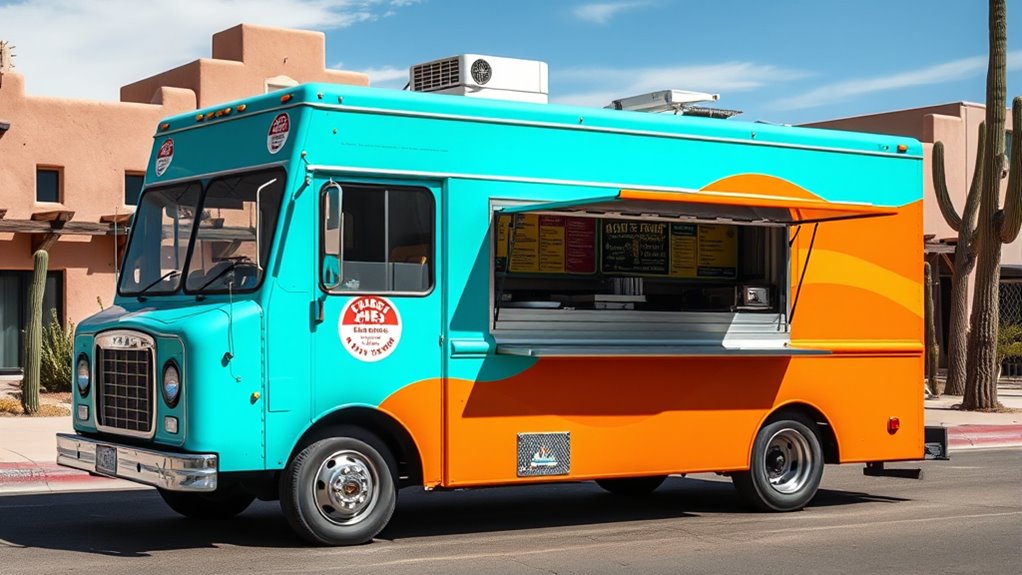
To operate a food truck in Mesa, AZ, you need to understand the local requirements, starting with the online permit application process. You’ll also need to follow sanitation protocols and keep proper records to stay compliant. Additionally, be aware of designated food truck zones to make certain you’re parking and serving legally.
Online Permit Application Process
Are you aware of how to navigate Mesa’s online permit application system for food trucks? The application process is straightforward, but understanding Mesa’s specific steps helps guarantee success. First, visit the city’s official website and locate the online permit portal. You’ll need to create an account to begin your application. Prepare all required documents, such as your business license and vehicle info, before starting. Use the table below to keep track of key steps:
| Step | Description |
|---|---|
| 1 | Register on the online portal |
| 2 | Complete the application form |
| 3 | Upload necessary documents |
| 4 | Pay the permit fee |
Following this process ensures your online permit application is complete and approved efficiently.
Sanitation Protocols and Recordkeeping
Maintaining proper sanitation is essential for food truck operators to comply with Mesa’s local health requirements. You must follow sanitation regulations closely to pass health inspections and avoid penalties. This includes regularly cleaning and sanitizing all surfaces, utensils, and equipment. Keep detailed records of your cleaning schedules, food temperatures, and employee hygiene practices, as Mesa’s health department requires thorough documentation. These records demonstrate your commitment to safety and help streamline inspections. Ensure your staff is trained on sanitation protocols and understands the importance of consistent recordkeeping. Staying organized and diligent not only helps meet local standards but also protects your customers’ health. By adhering to these protocols, you’ll build trust and ensure your food truck remains compliant with Mesa’s health regulations.
Designated Food Truck Zones
Understanding where you can operate your food truck is a key part of staying compliant with Mesa’s health and zoning regulations. Mesa designates specific food truck zones to ensure proper food truck parking and prevent conflicts. You’ll need event permits for special occasions or festivals, which often have designated areas. Check local maps and city ordinances to identify approved zones. Here’s a quick overview:
| Location Type | Requirements |
|---|---|
| Food Truck Zones | Use designated zones for daily operations |
| Event Permits | Obtain permits for festivals or special events |
| Private Property | Get owner approval before parking |
| Public Areas | Confirm with city for authorized public spaces |
Sticking to these zones and permits helps avoid fines and keeps your operation legal.
Setting Up Your Base of Operations
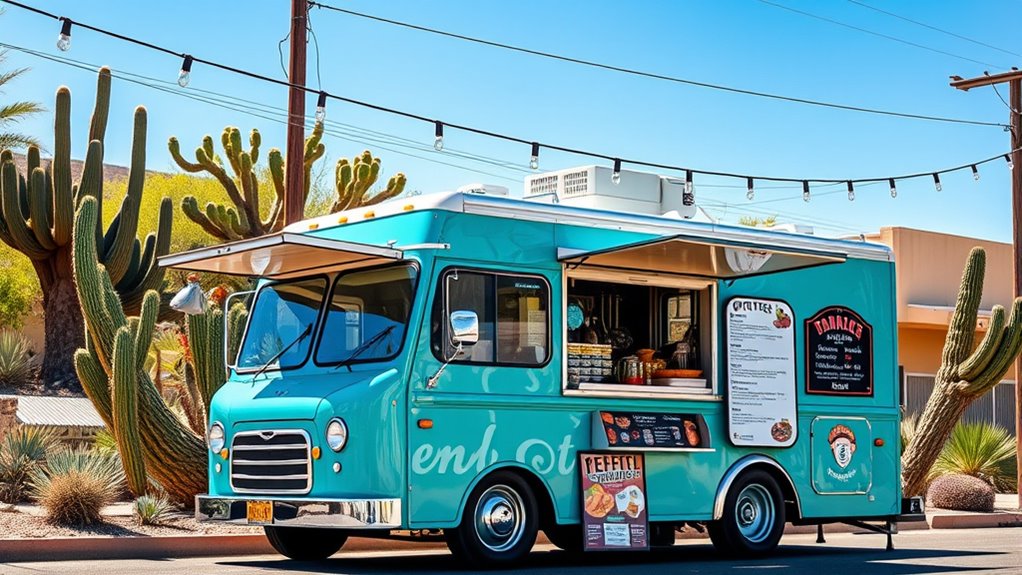
When setting up your base of operations, you’ll need to ensure shared kitchen licensing requirements to stay compliant with local health codes. Planning your kitchen layout carefully ensures you maximize space and efficiency for food prep and storage. Utilizing vertical storage solutions can help free up valuable floor space and improve organization. By addressing these points early, you’ll create a solid foundation for your food truck business in Mesa.
Shared Kitchen Licensing Requirements
Are you ready to set up your food truck’s base of operations in Mesa, AZ? One key step is understanding shared kitchen licensing requirements. You’ll need to find a licensed shared kitchen that meets local food safety standards and allows for commercial food prep. These kitchens often have designated spaces, commercial-grade appliances, and strict sanitation protocols. When applying for licensing, you’ll submit proof of your shared kitchen’s compliance with health department regulations. Keep in mind, the shared kitchen must be inspected and approved before you start operations. Visualize a clean, organized space with stainless steel counters and industrial ovens—ready for your culinary creations. Ensuring your shared kitchen meets licensing requirements is essential for legal, smooth operation of your food truck.
Custom Kitchen Layout Planning
Once you’ve secured a licensed shared kitchen, planning a custom layout helps streamline your food prep process. Your goal is to create an efficient workspace design that optimizes flow and productivity. Start by mapping out zones for storage, prep, cooking, and cleaning. A well-designed custom kitchen layout minimizes cross-traffic and reduces wasted steps, saving time during busy hours.
| Zone | Key Features |
|---|---|
| Storage | Ample shelves, clear labeling |
| Prep & Cooking | Counter space, organized appliances |
| Cleaning | Easy access to sinks and waste disposal |
Budgeting and Financing Your Food Truck
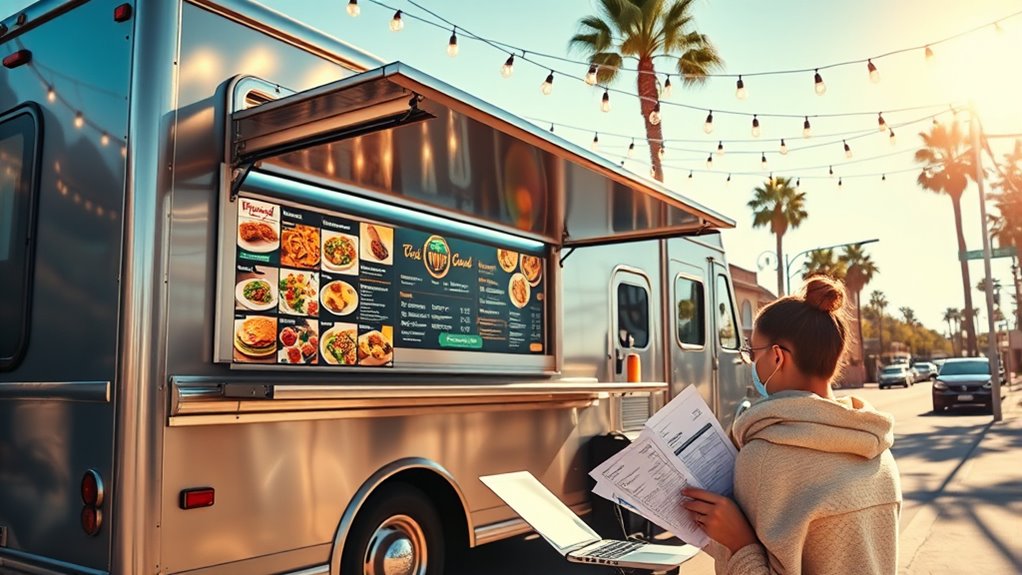
To get your food truck off the ground, you’ll need to contemplate initial vehicle costs and how to finance them. Small Business Administration loans can help cover expenses, but don’t forget to budget for liability coverage and potential tax deductions. Knowing these financial aspects early on will set a strong foundation for your business. Additionally, understanding the costs associated with glycolic acid products can be beneficial if you plan to incorporate skincare into your offerings or branding.
Initial Vehicle Purchase Costs
Purchasing your food truck is a significant first step, and understanding the initial costs is essential for effective budgeting. The price of a new or used truck varies based on size, condition, and customization. Expect to consider the costs of outfitting the vehicle with kitchen equipment, which can include appliances, cooking surfaces, and storage. Don’t forget vehicle maintenance, as a reliable truck reduces downtime and repairs. Fuel efficiency is also vital, helping you save money during daily operations. Visualize your investment with these key elements:
- A sleek, fully equipped food truck ready for the streets
- A shiny engine, tuned for ideal fuel efficiency
- Custom cabinetry and cooking stations inside
- A dependable vehicle with low maintenance needs
Understanding these costs helps you plan your budget wisely from the start.
Small Business Administration Loans
Securing funding is a key step in turning your food truck plans into reality, and Small Business Administration (SBA) loans offer a practical financing option. These loans provide access to funding opportunities that can cover vehicle purchases, equipment, and operating costs. The loan application process is straightforward but requires preparation—gathering financial statements, a solid business plan, and proof of your ability to repay. SBA loans typically have favorable terms, including lower interest rates and longer repayment periods, making them attractive for new entrepreneurs. By exploring SBA options, you can secure the necessary capital to start your food truck in Mesa, AZ, without overwhelming upfront costs. Understanding the process helps you navigate funding opportunities confidently and set a strong financial foundation.
Liability Coverage and Deductions
Ever wondered how to protect your food truck business from unexpected costs while maximizing your savings? Understanding liability coverage and tax deductions is key. Food truck liability safeguards you from claims related to accidents, injuries, or property damage, preventing financial strain. To optimize your budget, track deductible expenses like equipment, supplies, and vehicle maintenance. Proper liability coverage guarantees you’re covered in case of mishaps, while claiming tax deductions reduces your taxable income, saving you money.
Consider these aspects:
- Extensive liability insurance to cover accidents
- Deductions for vehicle repairs and maintenance
- Expenses related to food supplies and ingredients
- Costs for permits, licenses, and marketing
Designing Your Menu and Pricing Strategy

To create a menu that resonates with Mesa’s local flavor, focus on including regional ingredients and dishes that appeal to your target audience. Calculating ingredient costs accurately helps you set prices that cover expenses while staying competitive. Balancing authenticity with affordability is key to developing a successful menu and pricing strategy.
Locally Inspired Menu Curation
Creating a locally inspired menu for your food truck involves choosing dishes that reflect the flavors and ingredients unique to Mesa, AZ, and its surrounding region. Your menu curation should highlight the area’s rich culinary heritage and fresh produce. Think about incorporating ingredients like prickly pear, chiles, and citrus to create authentic, memorable dishes. Focus on offering a variety of options that appeal to diverse tastes while staying true to local roots. Visualize your menu with these elements:
- Tacos filled with mesquite-smoked meats and local salsas
- Fresh citrus salads with Arizona-grown oranges and grapefruits
- Warm, hearty burritos with regional chiles and spices
- Sweet prickly pear desserts or beverages
Ingredient Cost Calculations
Designing your menu with locally inspired dishes requires careful calculation of ingredient costs to guarantee profitability. Start with thorough ingredient pricing to understand the true expense of each dish. Conduct a detailed cost analysis by tracking ingredient amounts and prices, ensuring accurate margins. Use the following table to guide your calculations:
| Ingredient | Cost per Serving |
|---|---|
| Tomatoes | $0.50 |
| Chicken | $1.20 |
| Spices | $0.30 |
| Total Dish Cost | $2.00 |
| Selling Price | $6.00 |
| Profit Margin | 66.7% |
This approach helps you set competitive prices while maintaining healthy profit margins, ensuring your food truck remains financially sustainable and appealing to customers.
Technology and Operations
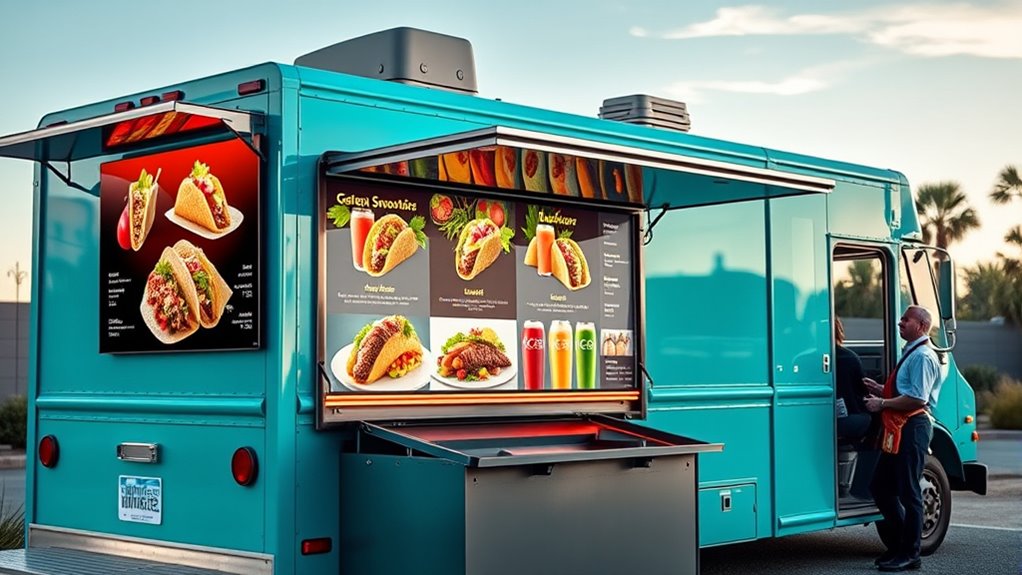
You’ll want to explore wireless card reader options to keep your transactions quick and secure. Real-time stock tracking software helps you stay on top of inventory and reduce waste. Combining these tools streamlines your operations and keeps your food truck running smoothly. Additionally, implementing inventory management strategies can further optimize your stock levels and minimize food spoilage.
Wireless Card Reader Options
Choosing the right wireless card reader is essential for smooth transactions at your food truck. It ensures quick, secure payments and keeps customers happy. When exploring wireless card readers, consider options that support various mobile payment solutions, making checkout seamless. Imagine a compact device, easily portable, fitting comfortably in your hand. Picture customers tapping their cards or smartphones, enthusiastic to pay without delays. Reliable wireless connectivity is key, preventing transaction failures during busy hours. Ease of setup and compatibility with your point-of-sale system also matter. Think about a device with a durable build, ready to handle outdoor conditions. Features like encryption and fraud protection give peace of mind. Ultimately, selecting the right wireless card reader helps you deliver efficient service, boosting customer satisfaction and sales.
Real-Time Stock Tracking Software
Implementing real-time stock tracking software transforms how your food truck manages inventory by providing instant updates on ingredient levels and sales. With accurate inventory management, you can avoid shortages and overstocking, ensuring your menu runs smoothly. The software also simplifies staff scheduling by predicting busy times based on sales data, helping you assign shifts more effectively. You’ll save time on manual counts and reduce errors, allowing you to focus on serving customers. Alerts notify you when stock runs low, so you can reorder promptly. This technology streamlines operations, improves efficiency, and keeps your food truck well-stocked. Overall, real-time stock tracking software enhances your ability to manage inventory and staff scheduling seamlessly, leading to better service and increased profitability.
Marketing and Growing Your Presence
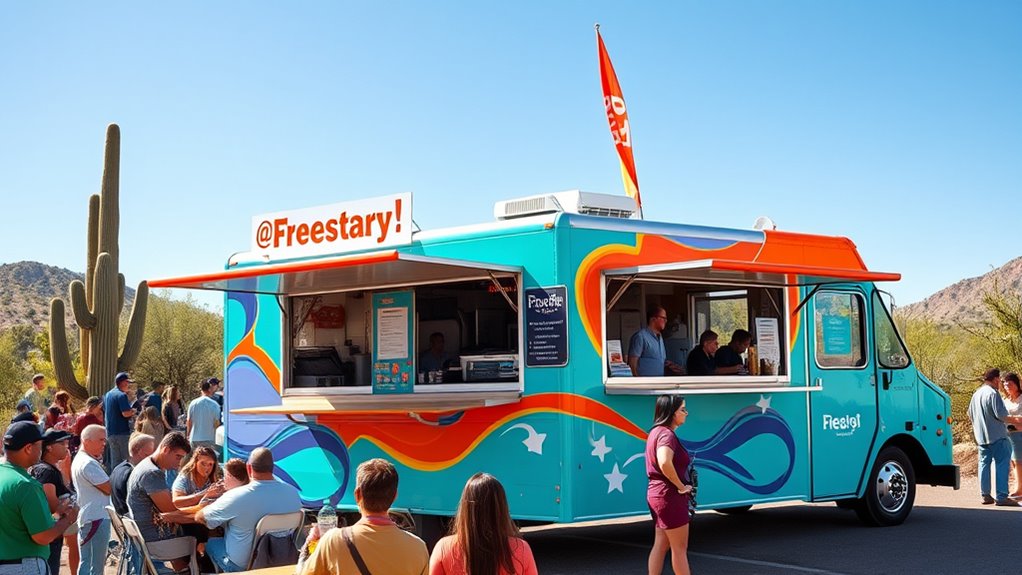
To boost your food truck’s visibility, focus on scheduling your appearances at popular local events. Engaging customers with giveaways can turn casual visitors into loyal fans. These strategies help you grow your presence and attract a steady stream of new customers. Additionally, utilizing analytical cookies can provide insights into customer preferences and improve your marketing efforts.
Popular Event Scheduling Tips
Scheduling your food truck events strategically can substantially boost your visibility and customer base. Effective event scheduling ensures you reach the right audiences at the right times, maximizing your impact. Focus on coordinating with vendors and event organizers to align your availability with popular community gatherings. Consider local festivals, farmers markets, and sporting events, which draw large crowds.
To stand out, visualize:
- A bustling park filled with enthusiastic foodies during a weekend festival
- A lively downtown street fair with multiple vendors
- An afternoon farmers market with families browsing stalls
- An evening concert series with crowds enjoying music and food
Customer Engagement Through Giveaways
Customer engagement through giveaways is a powerful way to increase your food truck’s visibility and attract new customers. By offering free meals or discounts via social media, you encourage people to share your content and spread the word. Use platforms like Instagram and Facebook to announce giveaways, making it easy for followers to participate and share with friends. This not only boosts your online presence but also fosters customer loyalty, as patrons feel appreciated and connected to your brand. Consistent giveaways can turn casual customers into regulars who look forward to your promotions. Remember to set clear rules and choose prizes that resonate with your audience. Over time, these giveaways will help grow your presence in Mesa, AZ, and create a loyal customer base.
Master Local Food Trends

Staying ahead of local food trends is essential if you want your food truck to stand out in Mesa. By mastering these trends, you can attract more customers and boost your food truck branding. Keep an eye on popular flavors, dietary preferences, and presentation styles that resonate locally. Use social media marketing to showcase your innovative dishes and connect with food enthusiasts. To create a vivid image, consider these trends:
Staying ahead of local food trends boosts your food truck’s appeal and brand visibility in Mesa.
- Tacos with local ingredients and bold flavors
- Plant-based and vegan options gaining popularity
- Fusion dishes blending Southwestern and international cuisines
- Instagram-worthy, colorful food presentations
Frequently Asked Questions
What Are the Best Locations for Food Trucks in Mesa?
You should target busy spots like Downtown Mesa, near event venues, and popular parks for food truck locations. Use food truck marketing to attract customers and boost visibility. Engage in social media promotion to announce your daily spots and special events. By consistently parking in high-traffic areas and promoting your location online, you’ll draw more customers and build a loyal following in Mesa.
How Do I Obtain a Food Truck Parking Permit?
You need to visit the Mesa City website to understand parking regulations and find the permit application process. Complete the permit application form, providing details about your food truck and proposed locations. Submit the form along with any required documents and fees. Once approved, you’ll receive your parking permit, allowing you to legally operate your food truck in designated spots. Always check for updates or specific restrictions to stay compliant.
What Insurance Coverage Is Necessary for a Mesa Food Truck?
You need to get food truck insurance that includes liability coverage to protect yourself and your customers. This coverage helps pay for damages or injuries caused by your truck. Make certain your policy also covers vehicle damage, fire, and theft. In Mesa, AZ, having all-encompassing food truck insurance is essential to meet legal requirements and ensure you’re financially protected while serving delicious food.
Are There Any Local Food Festivals That Support New Vendors?
Yes, Mesa offers food festival opportunities that support new vendors like you. These events often feature vendor support programs, helping you gain exposure and grow your customer base. Keep an eye on local event calendars and community boards, as they regularly promote upcoming festivals welcoming fresh food trucks. Participating in these festivals can boost your visibility, connect you with other vendors, and help establish your reputation in the Mesa food scene.
How Do I Find Reliable Suppliers for Ingredients and Equipment?
To find reliable suppliers for ingredients and equipment, you should focus on building strong supplier relationships by researching local vendors and reading reviews. Attend industry trade shows and equipment sourcing events to connect with trusted providers. Reach out directly to suppliers to discuss your needs and negotiate terms. Establishing consistent communication and checking references helps guarantee you get quality ingredients and equipment, setting a solid foundation for your food truck business.
Conclusion
Starting a food truck in Mesa, AZ, is like planting a seed that can grow into a thriving business. By understanding local rules, crafting a unique menu, and embracing community trends, you set yourself apart. Stay adaptable, keep your passion fueled, and leverage marketing strategies to spread the word. With dedication, your food truck can become as much a staple in Mesa as the desert sun—bright, enduring, and impossible to ignore.
